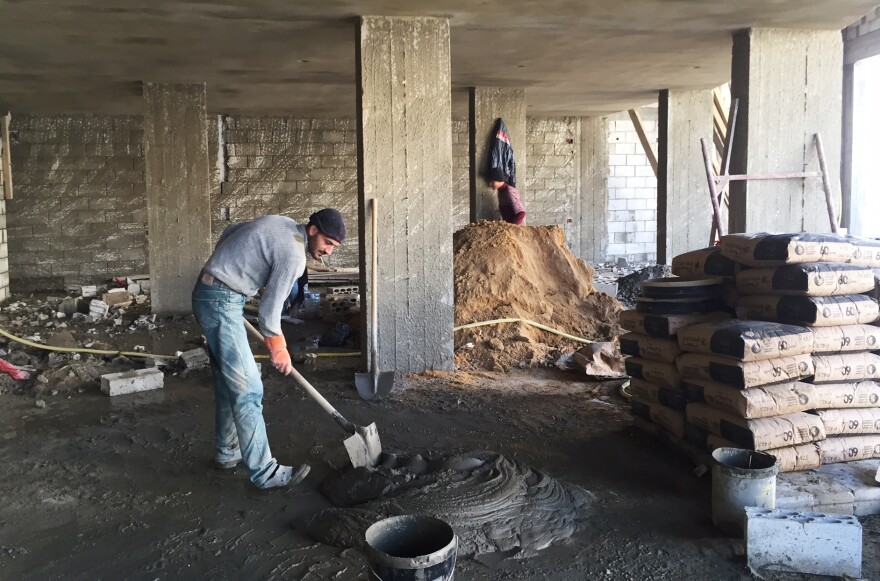It's a common sight in Lebanon: a construction site where every laborer slapping cement onto cinder blocks is a Syrian refugee working illegally. The men take a break to smoke and to tell me how things are.
Yeah, they say, their breath clouding the cold air. Of course they owe money.
"Especially in wintertime," says Radwan Mahmoud. "The jobs are getting less and less."
The farms near this village in the fertile Bekaa Valley don't need laborers now.
Mahmoud is supporting 12 family members. He'll make $16 today, and he doesn't get many days' work. So he buys food on credit. He's four months behind on rent.
Other men, huddling around a small fire, chime in. They tell me they're all in the same situation and see no way out.
Then they go back to work.
With a population of about 4 million, Lebanon is host to more than 1 million Syrian refugees. No country in the world has such a high percentage of refugees.
The Syrians in Lebanon rely on aid agencies and their own resources to survive. Like Mahmoud, many of them have fallen deeply into debt.
About 4 1/2 years since an uprising in Syria spiraled into civil war, hearing that refugees are broke is hardly surprising — though maybe the scale of the problem is.
"Ninety percent of the more than 1 million refugees in Lebanon are in deepening debt," says Dana Sleiman of the U.N.'s refugee agency, "and they're not able to pull themselves out of this debt."
The average debt of each family is about $850, based on a U.N. survey of 4,000 refugee families.
Lebanon doesn't allow refugee camps because the government doesn't want to encourage refugees to stay. So most pay rent on a house — or just a plot of land to pitch a tent on.
"That's not something they can afford," Sleiman says. "So they accumulate debt."
They're trapped by that debt because the government has made it very difficult for Syrians to work legally in Lebanon and imposed annual fees on the refugees.
Better-off Syrian families have often helped the poorest ones with gifts or loans. But now their resources are dwindling, too.
Still, Sleiman says creditors often help refugees rather than taking advantage of them.
In the little town of Bar Elias, residents are outnumbered by refugees living in tents and shabby houses with their animals. You can see how the debt builds up.
In a grocery store run by Abdullah Ali el-Ali, "People come in and they ask me to be patient," he says. The U.N. cut food vouchers from $30 a month to about $20, and fewer refugees get them. More and more people ask him for food on credit, he says — "two packs of bread, just for the children."
Occasionally, he says no. But a lot of the time, he says yes — even when customers already owe him hundreds of dollars.
People tell me similar stories about patient landlords. The Lebanese villages are close to the Syrian border; families often straddle both sides, the ties strengthened by shared business interests, legal and illegal trade, marriages.
The area is largely rural and poor. There's a culture of helping out in times of need.
In a store that sells warm clothes to the refugees, paid for in tiny installments, the manager, Birhan al-Sadr, tells me when this area was bombarded by Israel during the 2006 conflict, Syrians over the border opened up their homes to fleeing Lebanese.
"There were many, many Lebanese families in Damascus," he says. "They didn't have any tents or anything like that."
A lot of Lebanese feel it's an obligation now to reciprocate.
In Abdullah Ali el-Ali's dusty grocery shop, Younes Shereedeh, a middle-aged Syrian refugee trying to feed his wife and three children, doesn't meet my eye when it comes to talking about the more than $500 he owes the grocer.
He hasn't been given U.N. vouchers in two years, he says. He can't afford fuel for his stove.
Back home, he used to run a mini-market much like this one.
"No, I had no idea I'd be asking for credit like this," he says.
He'd never have let someone run up a debt as big as his. It's a lot of money.
"They're good people here," he says.
Copyright 2020 NPR. To see more, visit https://www.npr.org. 9(MDAwMTM1NDgzMDEyMzg2MDcwMzJjODJiYQ004))




